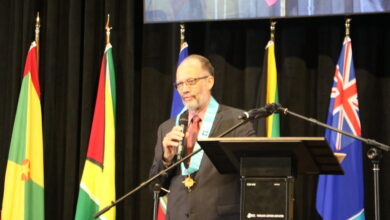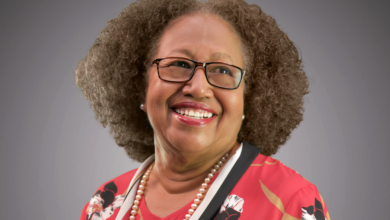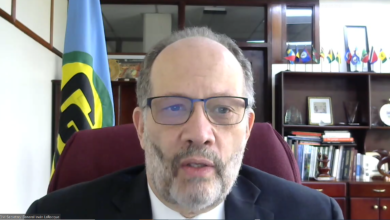Introduction
Let me begin my expressing appreciation for the warm words of welcome extended to me and my delegation this morning. Secretary General Ban Ki-Moon, with the current global events, all of which demand your attention, it is heartening that our Caribbean Community’s biennial encounter is of sufficient importance to ensure your presence.
CARICOM places much importance on these Meetings between the Caribbean Community, its Associated Institutions and the United Nations System. These biennial meetings are not merely ritual encounters or polite engagements, but are vital working sessions in which discussions are of necessity, strategic, pragmatic, forward-looking and results oriented. The Meetings provide an excellent opportunity for regional and international technical experts, who are well informed and well positioned, to exchange views, diagnose current cooperation and to identify concrete projects in specific priority areas which will yield results on the ground, ensuring tangible benefits to the citizens of the Caribbean Community.
Setting the Context
This Seventh General Meeting takes place at a time when the world contemplates the future beyond the global development compact represented by the Millennium Development Goals. We meet when, fittingly, a Caribbean national, in the person of Ambassador John Ashe of Antigua and Barbuda, is preparing to assume the Presidency of the 68th Session of the UN General Assembly and is charged with presiding over the Assembly’s consideration of the Post 2015 Development Agenda.
This 68th session will be crucial in setting the stage for the launch of that agenda. We have a great interest in developments in relation to its elaboration, and our Community will take an active role in the deliberations with a view to ensuring that the Region’s interests are adequately and effectively addressed.
We seek an integrated, comprehensive and flexible Development Agenda building on the lessons learned from the MDGs and which is responsive to the diverse development realities with which individual countries and regions are confronted.
Securing our Caribbean
Secretary General, colleagues, one of the critical areas in which the UN and CARICOM have forged an enduring and important partnership is citizen security, an issue of paramount concern to the Caribbean Community. Such are the dimensions of the scourge of crime and insecurity in our Region that CARICOM Heads of Government saw it fit to make security the fourth pillar of the Community.
CARICOM joined the global family of nations earlier this year, under the auspices of the United Nations, to adopt a landmark agreement, the Arms Trade Treaty. For us in the Caribbean, the stemming of the illegal trade in arms, and in particular Small Arms and Light Weapons, is of paramount importance. Such illegal trade, in which the Caribbean finds itself a vulnerable transiting point, is wreaking havoc in our small communities, terrorising neighbourhoods, claiming innocent lives, and compromising our economies by undermining our investment climate and socioeconomic development efforts.
The Community is fully seized of the fact that crime in the Caribbean cannot be solved by such interventions alone. CARICOM must do its part to help itself, and to this end, the Region has developed a targeted strategy to address the issue. The 2013 CARICOM Crime and Security Strategy is an important weapon in the Caribbean arsenal to fight the war against crime and I look forward to the UN’s full support in its implementation including through the long awaited re-opening of the UN Office on Drugs and Crime in Barbados.
Global Financial and Economic Crisis
Development threats come in many forms, and even as the Caribbean grapples with those posed by crime, it grapples too with the effects of a protracted global financial and economic crisis that holds many of its small developing economies in a near stranglehold. Small economies like those of CARICOM have structural and institutional characteristics which increase their vulnerability to external events and limit their capacity for adjustment. This situation is exacerbated by onerous debt, and graduation from access to concessionary development funding based on criteria, such as GDP per capita, which do not take due account of vulnerability. The resulting prognosis for CARICOM’s economic resilience is unfavourable. Our Member States are however firm in their commitment that the CARICOM Single Market and Economy is the best means to attain sustainable development in the Region.
At the recently concluded Conference of CARICOM Heads of Government, our leaders discussed a framework to generate economic growth and development and in so doing recognised the need to pursue a development path which engenders inclusiveness of all stakeholders. That path should also lift the knowledge base, innovation capability, and entrepreneurial capacity of the Region’s people to engage in competitive, higher value-added economic activities. However, while these undertakings must be CARICOM-owned and driven, they can only be realistically achieved if CARICOM can examine, adapt and adjust global best practices to its needs, and benefit from the kind of international expertise and support that international organisations, such as the UN and its Agencies, can offer.
Fighting Climate Change, Pursuing Sustainability and Resilience
As CARICOM pursues its development agenda, it is obliged to factor in what for many seems like an abstract threat, but what for us is a lived, fearsome reality. I refer here to the effect of climate change and the related phenomena of sea level rise, increasing oceanic temperatures, and increased and more intense weather events. The Community’s advocacy regarding the implications of these intertwined phenomena on the socio-economic and fragile physical environment of the low lying island and coastal states of CARICOM is a fight for our very survival.
Our call for reliable, accessible, and sufficient climate financing, through mechanisms such as the UNFCC Green Climate Fund to allow us to build capacity to adapt and mitigate, is a critical factor in our pursuit of sustainable development.
It is essential for CARICOM, in pursuit of its goals, to engage in strategic alliances and sound negotiating and lobbying strategies. It also needs to have access to credible expertise, which the UN through its relevant institutions has been pivotal in providing. We count on that continued support as CARICOM prepares to participate in the Third International Conference for Small Island Developing States (SIDS) in Samoa in September next year.
Human and Social Development
Another key area for the Caribbean Community is NCDs. The UN High Level Meeting convened in September 2011 at the initiative of the Community focussed global attention on the scourge that NCDs represents. The assistance and expertise of PAHO/WHO contributed greatly to the success of the initiative which culminated with the adoption of a Political Declaration on the Prevention and Control of NCDs. Continuing multi-sectoral action is required for the implementation of the Political Declaration and for the preparation of the comprehensive review in 2014.
It is our understanding that all UN Resident Coordinators, by a joint communication of UNDP and WHO, have been mandated to ensure that the UN System gives priority to supporting implementation of the Political Declaration. This is deeply appreciated. In the Caribbean, we look forward to the coordination of the efforts of the UN System by UNDG LAC, a commitment made when it visited the CARICOM Secretariat last November. In this regard, a UN inter-agency support group in the Caribbean would be useful.
Conclusion- Improving the CARICOM UN Partnership
The UN and its institutions have been and, I am sure, will continue to be, important partners. In this regard, the CARICOM Delegation looks forward to engaging their UN Counterparts on the new coordination mechanism for the UN’s assistance to the Region, and on how the mechanism can deliver an even more effective CARICOM UN partnership.
Before I close, let me take this opportunity to thank our Diplomats, the CARICOM Permanent Representatives to the United Nations, for their continued commitment and dedication in advancing the interests of the Caribbean Community in a coordinated and skilful manner.
I wish for a most productive meeting, and reiterate my deep appreciation to you Secretary General and to your staff for your commitment to assisting CARICOM’s regional integration and sustainable development.
Thank you.




